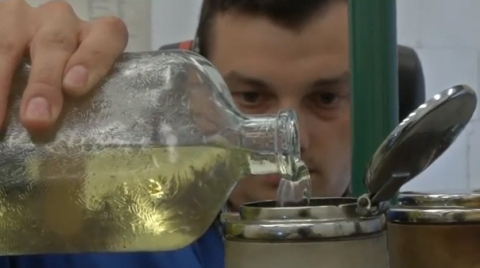
WARSAW, Poland (Reuters) — A group of Warsaw-based scientists say they have developed a new, economically viable method for transforming non-recyclable plastic waste into gasoline and diesel fuel which complies with European standards.
Inventor Adam Handerek’s team have worked together with the Automotive Industry Institute in Warsaw to construct a prototype reactor that converts popular plastics including polyethylene, polypropylene and polystyrene into gasoline and diesel fuel fractions.
Their method uses a vertical reactor with internal heat sinks, not directly heated by gas burners but via a circulating liquid heat carrier. Handerek says this allows for precise control of the temperature of the heating surface and prevents the raw material from being burned on the reactor walls – a common problem when processing plastics into fuel.
The plastic is heated to cracking temperature, producing a hydrocarbon fraction with a boiling point below 360 degrees Celsius, a solidification point below -20 degrees Celsius and a distillation curve typical for diesel fuel or gasoline.
The scientists say this hydrocarbon fraction does not need the additional, difficult refining processing used in refineries by oil companies. It can be distilled to the gasoline fractions that are the base for the gasoline, and diesel fuel fractions that only require some enrichment additives.
The fuel obtained has been tested by the Automotive Industry Institute in Warsaw, which says that it meets the qualification requirements of category 4A of the World Fuel Charter.
Handerek hopes his method will be used in the future in small-scale waste ecosystems in large cities, with the raw plastic collected from local recycling sites and converted into fuel for use in public transport.
The team has received an EU grant for the implementation of their technology and are setting up their first plant with the aim of starting fuel production in 2018.







